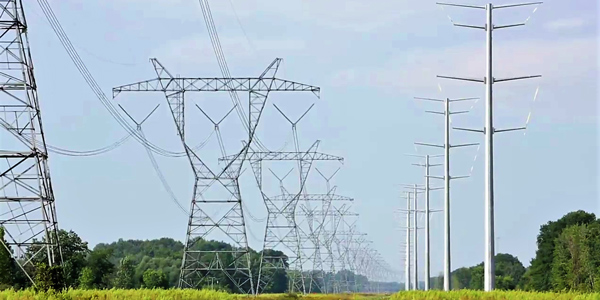By Amanda Durish Cook
FERC last week reduced the return on equity adders previously granted to ITC Holdings subsidiaries for being independent, standalone transmission providers, saying a 2016 merger affected the parent company’s autonomy.
The commission’s Thursday order said International Transmission Co., ITC Midwest and Michigan Electric Transmission Co. were no longer fully independent because ITC Holdings merged with Canadian and Singaporean companies in 2016. FERC reduced their “transco” adders to 25 basis points each effective April 20, 2018 (EL18-140).
FERC had granted ITC and METC 100-basis-point adders in 2003 and 2005, respectively, and ITC Midwest a 50-point adder in 2015.
But in 2016, Canada-based Fortis purchased 80.1% of ITC Holdings, while Singapore government-owned investment company GIC Private Limited acquired 19.9%. As a result, FERC now says the ITC subsidiaries are indirectly owned by two entities “with affiliates that participate in Eastern Interconnection energy and capacity markets.”
Tangled Associations
Several utilities had joined the complaint against ITC’s transco adders, including Consumers Energy, Interstate Power and Light, Midwest Municipal Transmission Group, Missouri River Energy Services, Southern Minnesota Municipal Power Agency and WPPI Energy. The complainants said the change in ownership meant ITC’s companies no longer have the full independence necessary to collect the approximately $24 million in annual revenues from the adders.
The utilities pointed out that Fortis subsidiary FortisOntario uses parts of the grid affected by the loop flow around Lake Erie that is managed by phase angle regulators owned and operated by the ITC companies. Another Fortis subsidiary, Central Hudson Gas and Electric, “generates, purchases and sells electricity over the Eastern Interconnection grid, in portions of New York state that can also be affected by the operation and planning of the ITC companies’ MISO-area facilities,” they noted.
They also said GIC subsidiary Epsom Investment indirectly owns 44.4% of Duquesne Light Co. and Duquesne Power, which sells retail electricity and markets power within PJM. Another GIC subsidiary, Camborne Investment, owns a “substantial minority stake” of four generators owned by Eastern Generation. The companies also said a Wisconsin Public Service Commission proceeding shows that “senior executives of the ITC subsidiaries, FortisOntario, Central Hudson, and other Fortis operating subsidiaries meet regularly, outside the Open Access Same-time Information System transparency contemplated by Order No. 889, to ‘collaborate on initiatives that are of interest and benefit to the regulated utility subsidiaries.’”
Finally, the complainants argued that “equity infusions from Fortis to ITC Holdings or dividends from ITC Holdings to Fortis may cause generation and transmission investments to compete for capital” and that ITC’s proposed 2,000-MW Big Chino Valley pumped storage hydroelectric facility in Arizona is evidence that the company is interested in pursuing investments outside of transmission.
ITC Holdings had argued there was “no credible argument” that Fortis, GIC or their affiliates are market participants in MISO and therefore could not affect its independence. The company also contended that FERC analyzes market participation for transco adders on an RTO basis, not an interconnection-wide basis, and pointed to NextEra Energy owning more than 38 GW of generation in the Eastern Interconnection. It also said it continues to be governed by an independent board of directors and is party to a shareholders’ agreement with Fortis that restricts ITC equity securities holders from MISO market participation.
The company said “nothing has changed in ITC Holdings’ planning of, investment in or operation of its transmission systems under the ownership of Fortis and GIC.”
But FERC said ITC’s merger “has reduced, but not eliminated, the ITC companies’ independence from market participants.” The commission relied on criteria in its Order 679 to scrutinize ITC’s independence and examined investment planning, capital formation, investment processes and business structure. In several areas, FERC found ITC still demonstrated “some level” of independence.
“We acknowledge certain minor potential conflicts of interest associated with other assets owned by Fortis and GIC may exist. However, such concerns are largely attenuated by the location of such assets and the fact that they are largely subject to small ownership shares by Fortis and GIC. Moreover, ITC’s and MISO’s actions have indirect and limited effects on their other affiliates or subsidiaries,” FERC said.
The commission said a 25-basis-point adder “appropriately encourages the transco business model in these circumstances and promotes corresponding consumer benefits.”
Commissioner Richard Glick dissented, saying the ITC companies are no longer sufficiently independent to justify any ROE adder.
“Fortis, which owns 80% of the ITC companies, assesses capital expenditures on a consolidated basis, meaning that in evaluating how to allocate capital among its subsidiaries, it is directly comparing investments in transmission with investments in other aspects of its business,” Glick wrote. “Even though the ITC companies are permitted to develop their own capital and business plans, Fortis and GIC retain ultimate authority with respect to those plans.”
ITC Reaction
An ITC spokesperson said the company was disappointed in FERC’s “failure to fully recognize our independence” and is reviewing its options, including rehearing and appeal.
“While the order acknowledges value in our business model, the commission found ITC to be less independent post Fortis ownership,” the spokesperson said in an email to RTO Insider.
ITC also recognized the issue could spark a review of transmission incentives.
The “order was characterized as a compromise solution, and several of the commissioners spoke to the need for a broad review of all transmission incentives. Such a review will provide an opportunity for a more expansive review of this and other transmission incentives offered under FERC’s policy statement,” the spokesperson said. “ITC will advocate that any change to current policy should take into consideration previously approved incentives, which were relied upon by developers to construct facilities that provide ongoing benefits to customers.”





